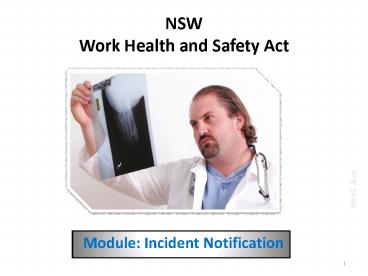NSW Work Health and Safety Act - PowerPoint PPT Presentation
1 / 12
Title:
NSW Work Health and Safety Act
Description:
NSW Work Health and Safety Act WHS Act Module: Incident Notification * About this Module * Purpose: To outline the requirements for incident notification under the ... – PowerPoint PPT presentation
Number of Views:467
Avg rating:3.0/5.0
Title: NSW Work Health and Safety Act
1
NSWWork Health and Safety Act
WHS Act
- Module Incident Notification
2
About this Module
Purpose To outline the requirements for incident
notification under the WHS Act
WHS Act
3
Learning Outcomes
- The key learning outcomes of this module are
- Understanding of the incident notification
requirements in the WHS Act - Understanding of the changes from the current NSW
incident notification requirements
WHS Act
4
What we currently have to do
WHS Act
- What are the current incident notification
requirements?
5
OHS Act 2000
- NSW OHS Act requires an occupier (usually also an
employer) to notify WorkCover immediately of a - Fatality
- Serious injury (e.g. amputation, burns)
- Serious incident that poses an immediate threat
although no one may have been injured - (e.g. excavation collapse
- .that occurred at the place of work
WHS Act
6
OHS Act 2000
- Secondly, the current NSW OHS Act requires in the
case of a fatality or any other incident
prescribed by the regulations that the site not
be disturbed - The site must not be disturbed for up to 36 hours
after the incident unless required to assist
injured workers or to prevent further injury - Notification by phone for serious incidents and
followed up by details in prescribed form within
7 days - All other incidents notified by prescribed form
within 7 days
WHS Act
7
What is different in WHS Act about Incident
Notification?
- New Act has similar notification requirements to
the current NSW legislation
WHS Act
New Act does not include 7 day unfit for work
provision found in NSW definition
8
Overview of WHS Act
What is a notifiable incident?
- An incident involving the death of a person,
serious injury or illness of a person or a
dangerous incident
WHS Act
What is a serious injury or illness?
An injury or illness including immediate
treatment as an in-patient in a hospital or
immediate treatment for amputation, spinal
injury, serious lacerations etc. or medical
treatment within 48 hours of exposure to a
substance at a workplace
9
Overview of WHS Act
What is a dangerous incident?
- An incident that exposes a person to serious risk
to their health or safety arising from an
immediate or imminent exposure to matters such
as, for example - an uncontrolled escape, spillage or leakage of a
substance, or - an uncontrolled implosion, explosion or fire or
- an uncontrolled escape of gas or steam.
WHS Act
10
What WHS Act says PCBUs must do
- Notify WorkCover of a notifiable incident
immediately after becoming aware of it - Notify by phone or in writing- quickest means
possible - Ensure that the incident site is preserved until
an inspector arrives or until directed by an
inspector. Does not prevent action to assist
injured persons or make site safe - Keep a record of notifiable incidents for 5 years
WHS Act
11
What is the likely impact of these changes?
- The WHS Act retains similar notification
requirements to those that currently apply so
little change is expected - The duty is for all PCBUs
WHS Act
12
Assessment questions
- What is an example of a serious injury or
illness? - What is an example of a dangerous incident?
- What has to happen if there is a fatality?
- Can the site of a fatality be disturbed?
WHS Act































